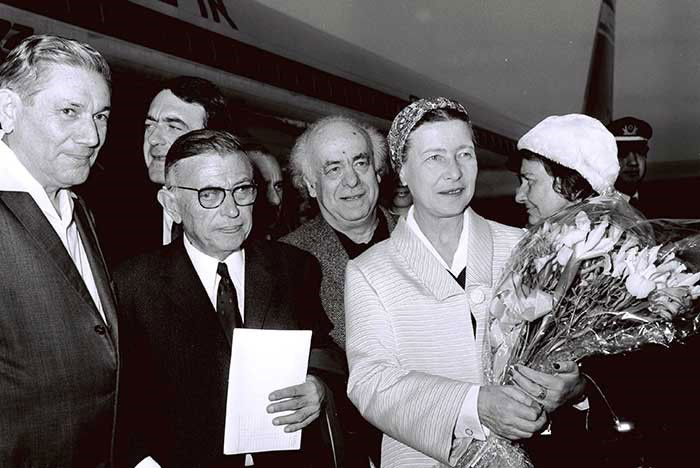Introducing the elite face; Simone de Beauvoir is a feminist writer and philosopher
Simone de Beauvoir is a French writer and philosopher of the 20th century and the author of the famous book "The Weaker Sex" or "The Second Sex", known for his campaign for women's rights. She is known as the most famous intellectual woman of the 20th century.
Simone de Beauvoir, full name Simone Lucie Ernestine Marie Bertrand de Beauvoir, was born on January 9, 1908 in Paris, in a Catholic family. The roots of religion were very strong in the family, and de Beauvoir was religious in his youth, even at one point in his life he wanted to go to Islam, but later he completely lost his faith in religion.
Simon de Beauvoir had different thoughts from the beginning and his father used to say about him: "Simon thinks like man." Also, despite the fact that she had different suitors like other middle-class girls at the beginning of her youth, she did not agree to marry and continued her education. Simone de Beauvoir later wrote about herself in the book Diary of a Happy Girl: "My father's individualism and moral characteristics were in contrast to my mother's conventional morality and were in complete contrast to it, which caused intellectual growth in me." After completing his preparatory education, he studied mathematics and philosophy at the Catholic Institute, and then studied languages and literature at the St. Marin Institute. He also studied philosophy at the Sorbonne University.
Simone de Beauvoir was a member of the circle of friends in Paris, where Jean-Paul Sartre was also a member. This circle made them friends, and then in 1929, these two people took part in the exam held for permission to teach philosophy. Jean-Paul Sartre was the first and de Beauvoir was the second. At that time, Simon de Beauvoir was the youngest person accepted in this test. Between Simone de Beauvoir and Jean-Paul Sartre, there is a complex emotional relationship throughout their lives that never reached marriage. There are shadows of moral scandals in de Beauvoir's life, even during periods when he was banned from teaching due to a complaint from the family of one of his students. But de Beauvoir and Sartre did not separate until the end of their lives. They used to review the works and the existentialist ideas of each of them were greatly influenced by the other.

In the last years of the Second World War, Simone de Beauvoir together with Jean-Paul Sartre wrote political magazine about their ideas and works. Merleau Ponty also collaborated in writing the articles of this magazine.
De Beauvoir worked in this magazine until the end of his life. The most important surviving work of Simone de Beauvoir is the book The Weak Sex or The Second Sex, which he published in 1949. It is said that he suggested a research about women. He asked Simone de Beauvoir to examine how being a woman affected his life and development. As a result, the book of weak sex was written.
A book that deals with the lives of women throughout history from different angles. In different chapters, he deals with femininity from political, social, cultural and psychological perspectives.
For this reason, he called this book the second sex, saying that in society, women are defined in relation to men. He believed: "The main source of oppression against women is their historical and social construction as a reality." This two-volume book sold more than 20,000 copies in its first week of publication. Simone de Beauvoir's feminist thoughts and her struggles make feminism a very serious thought. Today's thinkers are indebted to de Beauvoir and his activities.
In 1954, de Beauvoir wrote the book Mandarin, which won France's highest literary prize, the Goncourt Prize. From this author, I can mention the books "Quiet Death", "Secret Time", "Misunderstanding in Moscow" and "Other People's Blood".
Simone de Beauvoir also won awards for valuable works, among which the Jerusalem Prize in 1975 and the Austrian State Prize for European Literature in 1978 can be mentioned. Simon de Beauvoir died of pneumonia in 1986 at the age of 78.
He was buried next to Sartre. After de Beauvoir's death, films were made about his life. One of these films is called Violet, which is about a woman who meets de Beauvoir's works and follows him to Paris. This woman meets Simone de Beauvoir in Paris and this French writer helps her a lot to progress.
In 2008, at the same time as the centenary of Simon de Beauvoir, the Simon de Beauvoir Awards were established, which are given annually to a person who has courage and respectable thoughts. Among those who will win, he mentioned Malala Yousafzai, an Afghan social activist, and Taslimeh Nasreen, a Bangladeshi woman writer. Simone de Beauvoir's goddaughter is one of the jury members of this award.
Yasmin Samim